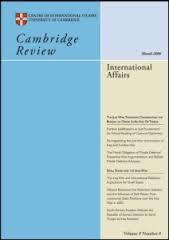Small Carrots, Few Sticks. EU Good Governance Promotion in Sub-Saharan Africa
Tanja A. Börzel, Christine Hackenesch – 2013
The European Union has developed a one-size-fits-all approach to promote good governance reforms in African countries, focusing on strengthening the effectiveness of state institutions while increasingly asking for reforms that also target their democratic quality. Assessing the EU's policies in Angola and Ethiopia reveals, however, that the implementation of this approach is more differential. While the EU has a hard time making the two governments address governance issues, it has been more successful in implementing its policy approach in Ethiopia than in Angola. These differences are largely explained by these countries' different degrees of interdependency with the EU rather than differences in stability and democracy. Unlike Angola, Ethiopia heavily relies on EU development aid, giving the EU greater leverage to push for governance reforms. While conditionality is more effective in making African governments address governance issues, it undermines the legitimacy of the EU's development cooperation, which emphasizes partnership and ownership.

